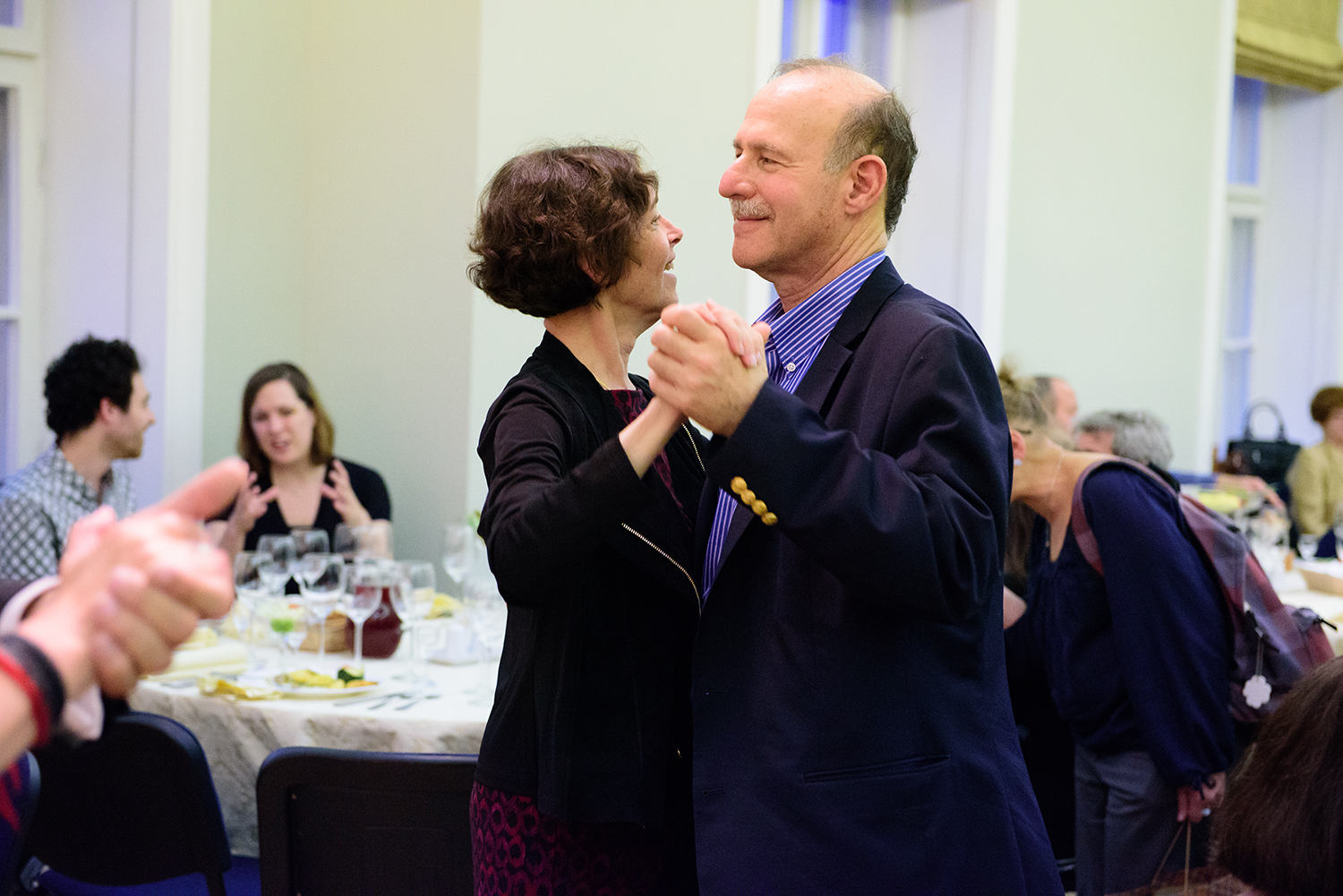On Monday, September 21, the Lithuanian Jewish Community screened a film by Marek Tomasz Pawlowski called “Dotkniecie aniola,” or “The Touch of an Angel,” in the Jascha Heifetz hall on the third floor of the community building in Vilnius.
Scheduled to begin at 5 P.M., the large hall was filled to overflowing and staff scrambled to find extra chairs to seat everyone. By 5:15 a variety of local people—a large contingent of students speaking Lithuanian and Polish, staff from the Vilna Gaon State Jewish Museum, teachers, local residents of different ethnicities—and a significant number of foreign visitors from Poland and Israel had been seated, and LJC chairwoman Faina Kukliansky addressed the audience, introducing Sebastian Rejak, special envoy of Poland’s minister of foreign affairs for relations with the Jewish Diaspora; Mickey Kantor, chairwoman of the Beit Vilna Association of Jews from Vilnius and Region; Ya’arit Glezer, deputy director of the Association of Lithuanian Jews in Israel and others.Head of the Political and Economics Department of the Polish embassy in Vilnius Maria Slebioda thanked the Lithuanian Jewish Community and chairwoman Faina Kukliansky for showing the film, and introduced it to the audience, calling it an unusual film in terms of content and cinematography, which was soon to become apparent to the audience as well. She spoke as well about the recent opening of a new museum of Jewish history in Poland, which she presented as evidence of Poland’s concern for Jews, along with a whole slew of other projects in Poland and at Polish embassies around the world. She gave several examples of projects supported by the Polish embassy to Lithuania, including an exhibit at the Vilna Gaon State Jewish Museum on Polish righteous gentiles and the screenign of a film about the liberation of a concentration camp. Last year there was an exhibit on Jan Karski, a Polish envoy who intentionally entered a transit camp (thinking it was a concentration camp) and told the world about the atrocities being perpetrated against the Jewish people of Europe. There were also two exhibitions in Vilnius about the hero Janusz Korczak, she said, and that this was only a portion of a long list of events organized and supported by the Polish embassy and Polish Institute. Slebioda said there was actually little choice but to keep up with the resolute execution of the policy by Warsaw to support Jewish heritage and to keep up with the Vilnius Jewish Community, which, while small, is also very active.
Sebastian Rejak spoke at length in Polish about the film, the Holocaust, visiting the Holocaust museum in Warsaw, Poland’s support for preserving Jewish heritage, expanding relations with Jewish communities in the Diaspora and other matters, with a simultaneous translation into Lithuanian.
By 5:25 the film was rolling and a hush went over the overflow audience. The film itself was bizarre. A man narrated in Polish, but even non-speakers heard there was something wrong with his voice, it was both pained and somehow off. He briefly recounted some moments from his childhood as the scenery switched back and forth between reconstructed scenes from the 1930s and 1940s and ruined buildings and landscapes in present-day Poland. It quickly becomes evident the man was a Jewish boy from Auschwitz, not the concentration camp, the actual town. A boy he used to play with sometimes who was struck dumb after a head injury and only occasionally commanded the power of speech suddenly told him one day, “All the sons of Abraham will be murdered. But you will survive. I know. The birds told me.” The boy, Henryk Schoenker, wasn’t sure what it meant, but it jolted him. There follow a series of flights by the family from one Polish location to another as the Nazis begin implementing the Holocaust. His father signs the family up for immigration to Palestine under one Nazi ruse which ends up saving the family’s life later. There is a prophetic meeting with a famous rabbi and supposedly a prophecy he made is fulfilled. Near the end Henryk Schoenker reveals he is deaf. A series of narrow escapes culminates in a meeting with what Henryk Schoenker says must have been an angel as the family hides in some grass near a lake. The strange man instructs them to stay hidden, and promises to bring them food. As Schoenker hikes over ruins of Nazi buildings and scenes from his childhood, he becomes increasingly bitter. There is a mixed message near the end: Schoenker says every Jew who survived the Holocaust in Poland was helped by at least one Pole, followed by his blanket condemnation of all non-Jews for not stopping it. “They knew, they all knew,” he says. “They did nothing. Nobody did anything.” Up until the end of the film Schoenker speaks as if the Nazi ruse of deporting Jews to Palestine had been real, a real offer on the table, but that the countries of the world had prevented the Nazis from implementing the relocation project. Knowledge about the Holocaust among the Allies is not discussed, only “they knew” is offered, and Allied victory against the Nazis at the cost of so many lives is not acknowledged. Instead Schoenker revels in a simple and almost child-like conception of what happened based on his personal memories. The most moving parts of the film involve childhood reasoning about the lives of dolls.As a personal memoir and testimony, the film is excellent. As a tool for telling children about the Holocaust, it is good yet terrifying and might not be appropriate for very young children. As history, it is a work of fiction. As cinematography, it suffers from an overbearing soundtrack, too many “soupy strings,” too much sad violin music which lasts for too long, and some of the quick transitions between scenes seems more a matter of haste and sloppiness than artistic intent. Despite that, the film is moving. The prophecy gleaned by the damaged child from the language of the birds, the “angel” in the guise of a man in robes with a long beard and staff and the family’s “flight” could all be considered religious symbols centering around the concept of spirits trapped in a material world, but just as “a little bird” informed Henryk’s friend of the coming Holocaust, so Henryk Schoenker demands the entire world employ that sort of epistemology, or claims they actually did, and also knew what was coming, what was happening and what had happened, and yet did nothing. He makes the claim despite the millions of non-Jewish lives lost defeating the Nazis in order to end their reign of barbarity.
The audience seemed to really appreciate the film and erupted into applause at the end.
Ironically, although the screening was included on the program of events to commemorate the 90th anniversary of the founding of YIVO in Vilnius, there were actually more audience members who came to watch the film than the number of people who turned out for the main YIVO birthday event the day before at the spacious Lithuanian parliament, a day-long conference.
The film ran for 60 minutes. It was almost entirely in Polish, with Lithuanian subtitles. Full credits and a description are available here:
http://www.imdb.com/title/tt4500584/

























